The EU in the World: Future Research Agendas
The EU in the World: Future Research Agendas
The EU in the World: Future Research Agendas
Create successful ePaper yourself
Turn your PDF publications into a flip-book with our unique Google optimized e-Paper software.
<strong>The</strong> <strong>EU</strong> <strong>in</strong> <strong>the</strong> <strong>World</strong>:<br />
<strong>Future</strong> <strong>Research</strong><br />
<strong>Agendas</strong><br />
Karen E Smith<br />
Anna L<strong>in</strong>dh Lecture<br />
19 October 2007
<strong>Research</strong> challenges<br />
Study<strong>in</strong>g <strong>the</strong> <strong>EU</strong>’s relations with <strong>the</strong> world is<br />
<strong>in</strong>herently complex:<br />
• it <strong>in</strong>volves multiple levels of enquiry<br />
(<strong>in</strong>ternational, <strong>EU</strong>, national, and below)<br />
and multiple actors at those levels;<br />
• it <strong>in</strong>volves a mov<strong>in</strong>g ‘target’,, <strong>in</strong> that <strong>the</strong><br />
<strong>EU</strong> foreign policy system has changed<br />
over time (with new <strong>in</strong>stitutions, new<br />
policy <strong>in</strong>struments, enlargement to new<br />
member states).
<strong>Research</strong> challenges<br />
• Understand and expla<strong>in</strong> <strong>the</strong> evolution<br />
of <strong>the</strong> <strong>EU</strong> foreign policy system<br />
• Understand and expla<strong>in</strong> <strong>the</strong> policy-<br />
mak<strong>in</strong>g process, <strong>in</strong>clud<strong>in</strong>g <strong>the</strong> output<br />
and implementation of policy<br />
• Understand and expla<strong>in</strong> <strong>the</strong> impact<br />
of common policies (on system, on<br />
member states, on world)
6 core questions<br />
1) Why do <strong>the</strong> member states agree to act<br />
collectively <strong>in</strong> <strong>in</strong>ternational relations?<br />
2) How are policies made?<br />
3) Why have <strong>the</strong> <strong>in</strong>stitutions and decision-<br />
mak<strong>in</strong>g procedures for mak<strong>in</strong>g <strong>EU</strong> foreign<br />
policies evolved <strong>in</strong> <strong>the</strong> way that <strong>the</strong>y have,<br />
and what impact do <strong>the</strong>se have on <strong>the</strong><br />
substance of any common policies agreed?<br />
4) What are <strong>the</strong> limits to <strong>EU</strong> collective<br />
action?
6 core questions<br />
• 5) What impact do <strong>the</strong> <strong>EU</strong> foreign<br />
policy <strong>in</strong>stitutions, decision-mak<strong>in</strong>g<br />
procedures and common policies<br />
have on <strong>the</strong> member states?<br />
• 6) What impact does <strong>the</strong> <strong>EU</strong> have on<br />
outsiders/<strong>in</strong>ternational relations?
<strong>The</strong>mes <strong>in</strong> current literature<br />
• (Italics <strong>in</strong>dicate extremely popular <strong>the</strong>mes)<br />
• Institutions/policy-mak<strong>in</strong>g<br />
mak<strong>in</strong>g:<br />
• <strong>the</strong> orig<strong>in</strong>s and potential impact of <strong>the</strong><br />
‘external relations’ provisions <strong>in</strong> <strong>the</strong> draft<br />
constitutional treaty;<br />
• <strong>the</strong> development and implementation of <strong>the</strong><br />
European Security and Defence Policy;<br />
• <strong>the</strong> impact of enlargement on <strong>the</strong> <strong>EU</strong>’s foreign<br />
policy-mak<strong>in</strong>g system;<br />
• <strong>the</strong> <strong>in</strong>tersection between <strong>the</strong> CFSP and <strong>the</strong><br />
Justice and Home affairs pillar
<strong>The</strong>mes <strong>in</strong> current literature<br />
• Policy-mak<strong>in</strong>g<br />
mak<strong>in</strong>g:<br />
• <strong>EU</strong> policies towards particular third<br />
countries/regions/organisations<br />
organisations/regimes;<br />
• values and norms <strong>in</strong> <strong>the</strong> <strong>EU</strong>’s foreign relations<br />
• Impact on member states:<br />
• <strong>the</strong> Europeanisation of national foreign policy<br />
(<strong>in</strong>clud<strong>in</strong>g new member states)<br />
• Impact on <strong>in</strong>ternational relations:<br />
• <strong>the</strong> <strong>EU</strong> and <strong>the</strong> broader <strong>in</strong>ternational system,<br />
with a related tendency to categorise <strong>the</strong> <strong>EU</strong>’s<br />
‘identity’ as an <strong>in</strong>ternational actor.
Suggestions for fur<strong>the</strong>r research<br />
• Policy-mak<strong>in</strong>g process (cross-pillar<br />
issues, coord<strong>in</strong>ation):<br />
• more on JHA/CFSP <strong>in</strong>tersection<br />
(why; how develop<strong>in</strong>g; impact of<br />
disappearance of JHA pillar)<br />
• more on foreign/security policy -<br />
development policy nexus (or<br />
tensions)
Suggestions for fur<strong>the</strong>r research<br />
• Policy-mak<strong>in</strong>g process (why/how<br />
policies made?):<br />
• why have certa<strong>in</strong> policy decisions<br />
been made? Examples: launch<strong>in</strong>g<br />
ESDP missions; enlargement
Suggestions for fur<strong>the</strong>r research<br />
• Impact of <strong>in</strong>stitutions on policy-<br />
mak<strong>in</strong>g<br />
• what is <strong>the</strong> impact that<br />
<strong>in</strong>stitutionalisation or ‘Brusselisation’<br />
or ‘legalisation’ may be hav<strong>in</strong>g on<br />
policy-mak<strong>in</strong>g: does it lead to<br />
agreement on more or on particular<br />
k<strong>in</strong>ds of policies, with more impact?
Suggestions for fur<strong>the</strong>r research<br />
• Impact of <strong>EU</strong> on member states<br />
(<strong>in</strong>clud<strong>in</strong>g new member states):<br />
• detailed empirical <strong>in</strong>vestigations<br />
(socialisation?? how<br />
extensive/deep?); (large-scale)<br />
comparative studies<br />
• limits to socialisation?
Suggestions for fur<strong>the</strong>r research<br />
• Impact on <strong>in</strong>ternational system: soft<br />
balanc<strong>in</strong>g; model; power; etc.<br />
• Impact on outsiders: particularly<br />
compared to local and o<strong>the</strong>r <strong>in</strong>t’l<br />
actors<br />
• Do<strong>in</strong>g research on <strong>the</strong>se two <strong>the</strong>mes<br />
entails leav<strong>in</strong>g <strong>the</strong> <strong>EU</strong>, and<br />
<strong>in</strong>volvement of researchers from<br />
outside <strong>the</strong> <strong>EU</strong>
Suggestions for fur<strong>the</strong>r research<br />
• Less argu<strong>in</strong>g over categories for<br />
<strong>the</strong> <strong>EU</strong> (‘normative(<br />
normative’, ‘ethical’,<br />
‘civilian’, ‘superpower’,, etc), more<br />
detailed research on what <strong>EU</strong><br />
actually does, what impact it<br />
actually has (see above)
Suggestions for fur<strong>the</strong>r research<br />
• Summ<strong>in</strong>g up:<br />
• more empirical research (and with<br />
historical depth)<br />
• more <strong>in</strong>volvement of scholars from<br />
o<strong>the</strong>r discipl<strong>in</strong>es, and from outside<br />
<strong>the</strong> <strong>EU</strong><br />
• accumulate f<strong>in</strong>d<strong>in</strong>gs, build collective<br />
knowledge



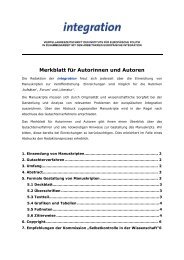
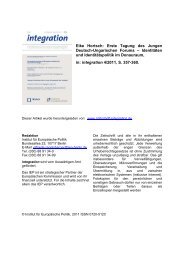
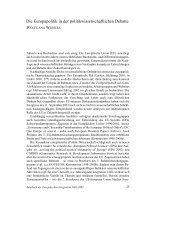
![Programm - Institut für Europäische Politik [IEP]](https://img.yumpu.com/22513455/1/184x260/programm-institut-fa-1-4-r-europaische-politik-iep.jpg?quality=85)
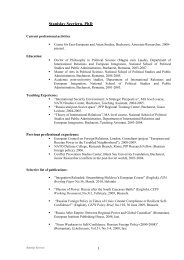
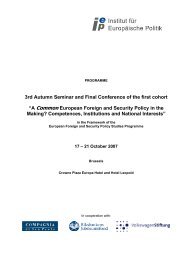
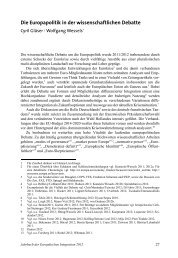
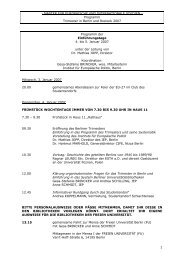
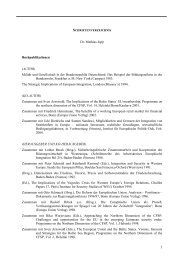
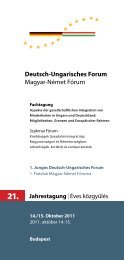
![ausführlichen Bericht zur AG3 - Institut für Europäische Politik [IEP]](https://img.yumpu.com/22513249/1/184x260/ausfa-1-4-hrlichen-bericht-zur-ag3-institut-fa-1-4-r-europaische-politik-iep.jpg?quality=85)
![PDF-Download - Institut für Europäische Politik [IEP]](https://img.yumpu.com/21861061/1/184x260/pdf-download-institut-fa-1-4-r-europaische-politik-iep.jpg?quality=85)

![Recruitment Notice - Institut für Europäische Politik [IEP]](https://img.yumpu.com/21834429/1/184x260/recruitment-notice-institut-fa-1-4-r-europaische-politik-iep.jpg?quality=85)